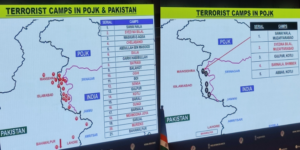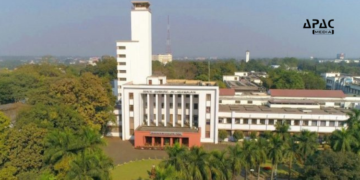New Delhi: In a decisive and targeted response to the recent Pahalgam terrorist attack, which claimed the lives of 26 individuals, including one Nepali national, India launched ‘Operation Sindoor’ early morning of 7 May, striking at the heart of terror infrastructure in Pakistan and Pakistan-occupied Jammu and Kashmir (PoK).
The Indian armed forces carried out 24 precision missile strikes on nine identified terror hubs, inflicting significant damage on terrorist capabilities without escalating into military confrontation with Pakistan.
At a joint press briefing held by officials from the Indian Army (Col Sofiya Qureshi), Indian Navy (Wg Cdr Vyomika Singh) and the Ministry of External Affairs, Foreign Secretary Vikram Misri underlined that the operation was a direct consequence of Pakistan’s continued patronage of cross-border terrorism.
“The attack in Pahalgam was marked by extreme barbarity, with the victims mostly killed with head-shots from close range and in front of their families. Family members were deliberately traumatised through the manner of the killing, accompanied by the exhortation that they should take back the message.”
“The attack was clearly driven by the objective of undermining the normalcy returning to Jammu & Kashmir. In particular, it was designed to impact the mainstay of the economy, tourism, with a record 23 million tourists visiting the valley last year. The calculation, presumably, was that harming growth and development in the Union Territory would help keep it backwards and create fertile ground for continued cross-border terrorism from Pakistan.”
“The manner of the attack was also driven by an objective of provoking communal discord, both in Jammu and Kashmir and the rest of the Nation. It is to the credit of the government and the people of India that these designs were foiled.”
Foreign Secretary Misri further stated that the attack’s characteristics align with Pakistan’s extensively documented and undeniable history of sponsoring cross-border terrorism in India. Moreover, Pakistan’s reputation as a sanctuary for global terrorists is well-established, with internationally designated individuals operating with impunity within its borders.
Furthermore, Pakistan has a known pattern of deliberately misleading international bodies, such as the Financial Action Task Force, on this matter. He also noted that the Sajid Mir case, where the terrorist was initially declared deceased only to be later found alive and arrested under international pressure, serves as a stark illustration of this deception.
Operation Execution and Targets
The Foreign Secretary then stated: “Our intelligence monitoring of Pakistan-based terrorist modules indicated that further attacks against India were impending. There was thus a compulsion both to deter and to pre-empt.”
Launched at precisely 1:44 am IST, the missile strikes were executed from within Indian airspace, showcasing what military officials called a “measured and restrained” approach. “No Pakistani military facilities were touched. This was a focused anti-terror operation,” stated a senior Army official, adding that India deliberately avoided any military confrontation, despite the high-profile targets.
The nine locations struck were known breeding grounds for terror groups such as Lashkar-e-Taiba (LeT), Jaish-e-Mohammed (JeM), and Hizbul Mujahideen. The list of targets included:
Markaz Subhan Allah, Bahawalpur – Headquarters of Jaish-e-Mohammed, central to its recruitment and indoctrination programs.

Markaz Taiba, Muridke – LeT’s notorious training facility where Mumbai 26/11 attackers including Ajmal Kasab and David Headley were trained.

Sarjal, Sialkot – Training ground linked to the killing of four Indian soldiers in March 2025.

Mehmoona Joya, Sialkot – A Hizbul Mujahideen base from where the Pathankot Airbase attack was planned.

Markaz Ahle Hadith, Barnala (Bhimber) – Centre for arms storage and logistics, 9 km from LoC.

Markaz Abbas, Kotli – A compact training camp with capacity for 15 militants, 13 km from LoC.

Maskar Raheel Shahid, Kotli District – Known LeT base active in infiltration missions.

Shawai Nallah Camp, Muzaffarabad – LeT training camp 30 km inside PoK, long used for indoctrination and attack planning.
Markaz Syedna Bilal – Jaish-e-Mohammed’s arms and training hub, used as a staging ground for attacks.

According to military estimates, over 70 terrorists were neutralised and more than 60 were seriously wounded, marking a significant blow to operational capabilities of LeT and JeM.
The government also revealed that some of the terrorists trained at these camps were involved in recent high-profile attacks in Poonch (April 2023), Pahalgam (June 2024), and Mumbai (2008).
Misri stated, “These actions were measured, non-escalatory, proportionate, and responsible. They focused on dismantling the terrorist infrastructure and disabling terrorists likely to be sent across to India.”
You would also recall that the Security Council on 25th April 2025 had issued a Press Statement on the Pahalgam terror attack, underlining, and I quote, “The need to hold perpetrators, organisers, financiers and sponsors of this reprehensible act of terrorism accountable and bring them to justice”. India’s latest actions should be seen in this context.
Strategic Timing and Impact
Operation Sindoor was conducted just hours ahead of a planned nationwide civil defence drill covering 244 districts, signalling India’s enhanced preparedness in the face of asymmetric warfare. A Navy spokesperson added that India’s maritime forces have also been placed on “strategic alert” to deter infiltration through coastal routes.
Foreign Secretary Misri emphasised that the operation had been under consideration for several days, but was triggered by concrete intelligence from the Pahalgam attack investigation, which “unambiguously linked planning and execution to Pakistan-based entities.” He added, “India does not seek conflict, but will not hesitate to act in self-defence.”
Pakistan’s Reaction and Civilian Impact
In response, Pakistan has placed its air force on high alert, issuing a statement that it will respond “at a time and place of its own choosing.” However, Indian officials reiterated that the strikes were “non-escalatory,” carried out with surgical precision to avoid civilian or military casualties unrelated to terrorist operations.
Flight operations across North India saw disruptions, with airports in Srinagar, Jammu, Leh, Amritsar, and Delhi either suspending or altering services. Airlines, including IndiGo, Air India and SpiceJet, issued travel advisories in light of the volatile airspace. Delhi Airport also released a statement urging passengers to stay updated on changing conditions.
Government’s Message: Retribution and Restraint
The Ministry of Defence echoed the Army’s sentiment, affirming India’s commitment to holding perpetrators accountable. “We are not only avenging the loss of innocent lives but preventing future attacks by eliminating the infrastructure enabling them,” said a Defence Ministry official.
Prime Minister Narendra Modi, in an earlier statement, had vowed to pursue those responsible for the Pahalgam attack to the “ends of the earth.” Operation Sindoor appears to be a decisive first step in fulfilling that promise, signalling a hardened counter-terror posture and India’s strategic readiness to dismantle terror sanctuaries across the border.
































































Discussion about this post